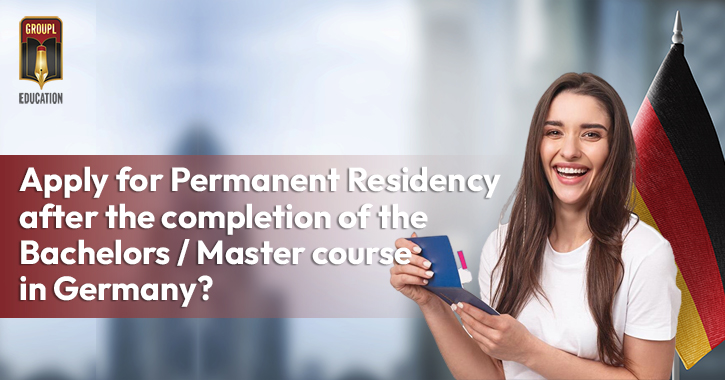Germany is not only known for its high-quality education system but also for its robust economy and high standard of living. Many international students are attracted to Germany for their higher education, and after completing their studies, they often consider staying in the country long-term. Applying for permanent residency (PR) in Germany is a structured process that allows graduates to transition from student life to professional life in Germany. Here’s a comprehensive guide on how students can apply for permanent residency in Germany after completing their bachelor’s or master’s degree.
Step 1: Extend Your Residence Permit
Upon completion of your degree, your student residence permit will expire. To stay in Germany and search for a job, you must apply for an 18-month job-seeking residence permit (Aufenthaltserlaubnis zur Arbeitsplatzsuche). To apply, you will need:
- A valid passport.
- Proof of graduation from a German university.
- Proof of health insurance.
- Proof of sufficient funds to cover your living expenses during the job-seeking period.
Step 2: Secure Employment
During the 18-month job-seeking period, you need to find employment that corresponds with your qualifications. Once you secure a job, you can apply for an EU Blue Card or a standard work permit.
Step 3: Obtain an EU Blue Card
The EU Blue Card is a residence permit for non-EU nationals with a university degree and a job offer in Germany. To be eligible for an EU Blue Card, you must:
- Have a job offer that pays at least €56,800 per year (as of 2024), or €44,304 per year in shortage occupations such as IT, engineering, and healthcare.
- Have a recognized university degree.
With an EU Blue Card, you can apply for permanent residency after 33 months of working in Germany. If you have adequate German language skills (B1 level), you can apply after 21 months.
Step 4: Apply for a Settlement Permit
If you do not qualify for an EU Blue Card, you can still apply for a settlement permit (Niederlassungserlaubnis). The requirements include:
- Having held a residence permit for at least four years.
- Proof of employment with contributions to the statutory pension insurance for at least 48 months.
- Sufficient knowledge of the German language (B1 level).
- Proof of stable income and adequate living space.
- Basic knowledge of the legal and social system in Germany.
Step 5: Language Proficiency and Integration Courses
Proficiency in the German language significantly enhances your chances of securing permanent residency. Enroll in language courses and consider taking integration courses to learn about German culture, laws, and society. These courses not only help in meeting the language requirement but also in fulfilling the integration requirement for the settlement permit.
Step 6: Gather Necessary Documentation
When you are eligible to apply for a settlement permit or EU Blue Card, gather the following documents:
- Valid passport.
- Proof of university degree.
- Proof of employment and income.
- Proof of health insurance.
- Rent contract or proof of accommodation.
- Pension insurance statements.
- Language proficiency certificates.
- Integration course certificate (if applicable).
Step 7: Submit Your Application
Submit your application to the local immigration office (Ausländerbehörde) in your city. It is advisable to make an appointment well in advance due to possible waiting times. Ensure that all your documents are complete and in order to avoid any delays in processing.
Step 8: Attend the Interview
You may be required to attend an interview at the immigration office. During the interview, the officer may ask about your employment, living situation, and knowledge of German laws and culture. Be prepared to answer these questions confidently.
Step 9: Await the Decision
The processing time for permanent residency applications can vary, so be patient. Once your application is approved, you will receive your settlement permit, allowing you to live and work in Germany indefinitely.
Conclusion
Applying for permanent residency in Germany after completing your Bachelor’s or Master’s degree is a structured but attainable process. By securing appropriate employment, demonstrating language proficiency, and fulfilling the necessary requirements, international graduates can successfully transition from student status to permanent residents, enjoying the numerous benefits that come with living in Germany long-term. For the most accurate and up-to-date information, always refer to the official German government websites and consult with the local immigration office.
